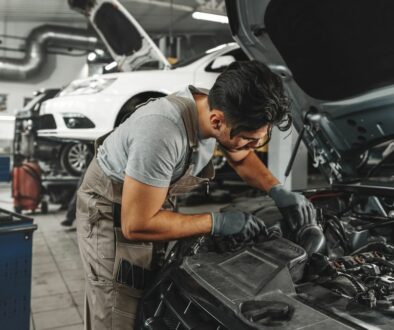How To Become A Motorcycle Mechanic?
Are you passionate about motorcycles? Do you enjoy fixing things? If so, becoming a motorcycle mechanic might be the perfect career path for you. Motorcycle mechanics are responsible for maintaining, repairing, and servicing motorcycles. In this article, we’ll explore the steps to becoming a motorcycle mechanic, the skills needed for this profession, and the benefits of working as a motorcycle mechanic.
Steps To Becoming A Motorcycle Mechanic
Becoming a motorcycle mechanic can be an exciting and rewarding career choice for those who have a passion for motorcycles and a desire to work with their hands. Motorcycle mechanics are responsible for repairing and maintaining motorcycles, ensuring that they are safe and running smoothly. Here are some additional steps to becoming a motorcycle mechanic:
- Develop a Passion for Motorcycles
Before embarking on a career as a motorcycle mechanic, it’s important to have a genuine passion for motorcycles. This means spending time learning about the different types of motorcycles, their engines, and how they work. You can attend motorcycle shows and events, read motorcycle magazines like cycle world, and join online forums like Adventure Rider to learn more about the world of motorcycles.
- Obtain a High School Diploma or Equivalent
As mentioned earlier, the first step to becoming a motorcycle mechanic is to complete high school or obtain an equivalent diploma. This is important because it provides a foundation in basic math, science, and communication skills that are essential for the job.
- Enroll in a Motorcycle Mechanic Training Program
Once you have completed high school, the next step is to enroll in a motorcycle mechanic training program. These programs are designed to provide hands-on training in motorcycle repair and maintenance. During the program, you will learn about motorcycle engines, transmission systems, brakes, suspensions, and electrical systems. It’s important to choose a program that’s certified by the National Institute for Automotive Service Excellence (ASE).
- Gain Work Experience
After completing the training program, it’s important to gain work experience in the field. This can be done by working for a dealership or motorcycle repair shop. This will give you hands-on experience repairing and servicing motorcycles. It’s important to continue learning and staying up-to-date with the latest technology in the field. Continuing education courses and certifications can help with this.
- Become Certified
Once you’ve gained enough experience and knowledge, you can become a certified motorcycle mechanic. To become certified, you’ll need to pass an exam administered by the ASE. Certification is not mandatory, but it can greatly increase your job prospects and earning potential as a motorcycle mechanic.
Becoming a motorcycle mechanic requires a combination of education, training, and hands-on experience. With dedication and hard work, you can turn your passion for motorcycles into a fulfilling career.
Skills Needed to Become a Motorcycle Mechanic
In addition to the aforementioned skills, there are several other important skills that a motorcycle mechanic should possess. One of these skills is a strong work ethic. Motorcycle mechanics often work long hours, and it’s important to have the stamina and dedication to see a job through to completion.
Another crucial skill is the ability to stay up-to-date with the latest industry trends and technology. The motorcycle industry is constantly evolving, and it’s important to stay informed about the latest advancements in engine technology, electrical systems, and other areas of motorcycle mechanics. This can be achieved through attending industry conferences, taking continuing education courses, and reading industry publications.
Attention to detail is also important when it comes to keeping accurate records of repairs. Motorcycle mechanics should keep detailed records of all repairs, including parts used, labor hours, and any other relevant information. This information is important for both the mechanic and the customer, as it can help with future repairs and maintenance.
Lastly, motorcycle mechanics should possess strong customer service skills. Building trust and rapport with customers is essential for building a successful business. Mechanics should be friendly, approachable, and able to communicate technical information in a way that is easy for customers to understand. A positive attitude and willingness to go above and beyond for customers can help build a loyal customer base and lead to repeat business.
What is a Motorcycle Mechanic?
Motorcycle mechanics play a crucial role in keeping motorcycles running smoothly and safely. They are highly skilled professionals who undergo extensive training and education to learn the ins and outs of motorcycle mechanics. They work in a variety of settings, including motorcycle dealerships, repair shops, and even as independent contractors.
One of the most important tasks of a motorcycle mechanic is diagnosing problems with motorcycles. This requires a keen eye for detail and a deep understanding of how motorcycles work. Mechanics use a variety of tools and techniques to diagnose problems, including computer diagnostic systems, visual inspections, and test rides.
Once a problem has been identified, the motorcycle mechanic will then work to fix it. This may involve replacing parts, repairing damaged components, or making adjustments to the motorcycle’s systems. It’s important for mechanics to work quickly and accurately, as motorcycle owners rely on their bikes for transportation and recreation.
In addition to repairs, motorcycle mechanics also perform routine maintenance tasks. This includes tasks such as oil changes, tire rotations, and tune-ups. These tasks are essential for keeping motorcycles running smoothly and preventing more serious problems from developing.
Motorcycle mechanics must also keep up with the latest developments in motorcycle technology. This requires ongoing education and training to stay up-to-date on the latest diagnostic tools, repair techniques, and industry standards. Many mechanics attend workshops and training sessions to stay current in their field.
Motorcycle mechanics are highly skilled professionals who play a vital role in keeping motorcycles running smoothly and safely. They are passionate about motorcycles and have a deep understanding of how these machines work. Whether working in a dealership, repair shop, or as an independent contractor, motorcycle mechanics are dedicated to providing the highest quality service to their customers.
The Benefits of Working as A Motorcycle Mechanic
Aside from the satisfaction of fixing motorcycles and helping customers, working as a motorcycle mechanic can come with a range of benefits. One benefit is that the career path allows for flexibility in terms of location. Motorcycle mechanics can work for dealerships, repair shops, or even start their own businesses. They can work in urban or rural areas and enjoy the freedom to travel while repairing motorcycles.
Another benefit is the earning potential. Motorcycle mechanics with experience and certifications can earn a good salary. The Bureau of Labor Statistics reports that the median annual salary in the United States was around $47,960 as of May 2023, with the top 10% earning more than $60,000. However, the earning potential can vary depending on the location and type of employer. For example, motorcycle mechanics in urban areas may earn higher salaries compared to those in rural areas. Additionally, those who work for high-end motorcycle dealerships or specialize in repairing high-performance motorcycles may earn higher salaries.
Aside from the financial benefits, working as a motorcycle mechanic can also be a fulfilling career for those who are passionate about motorcycles. Motorcycle mechanics get to work with a range of motorcycles, from vintage models to the latest high-tech machines. They also get to interact with motorcycle enthusiasts and help them keep their motorcycles in top condition. This can lead to a sense of pride and accomplishment in their work.
In terms of career growth, motorcycle mechanics can advance their careers by pursuing additional certifications or specializing in a particular area of motorcycle repair. For example, they can become certified in repairing specific motorcycle brands or models, or specialize in repairing motorcycle engines or transmissions. This can lead to higher salaries and more job opportunities.
However, becoming a successful motorcycle mechanic requires more than just technical skills. Motorcycle mechanics need to have good communication skills to interact with customers and explain repairs. They also need to have good time management skills to ensure that repairs are completed on time. Additionally, they need to have physical dexterity and strength to handle heavy and complex motorcycle parts.
Becoming a motorcycle mechanic requires formal training, work experience, and dedication to staying up-to-date with the latest technology in the field. Successful motorcycle mechanics possess attention to detail, problem-solving skills, physical dexterity and strength, and good communication skills. The benefits of working as a motorcycle mechanic include flexibility in terms of location, good earning potential, and the opportunity to work with a range of motorcycles and interact with motorcycle enthusiasts.




